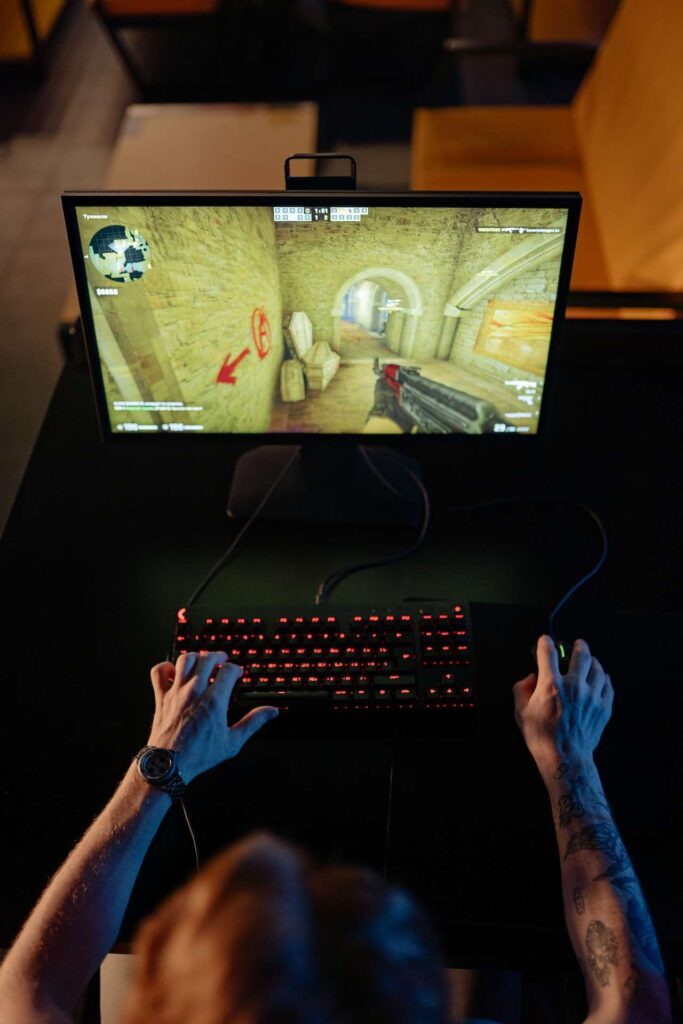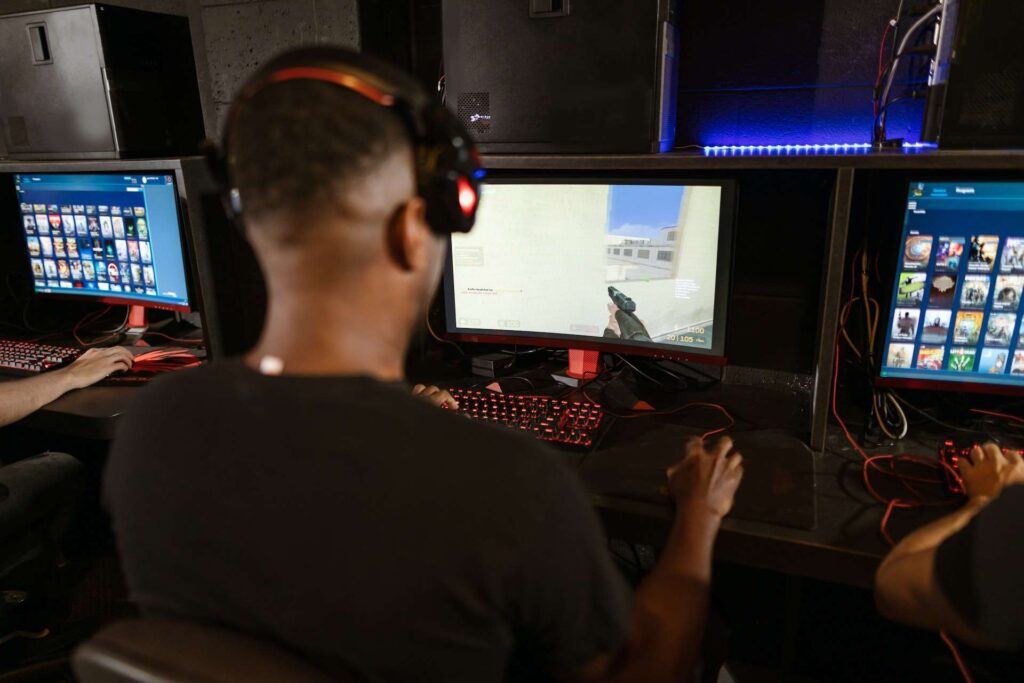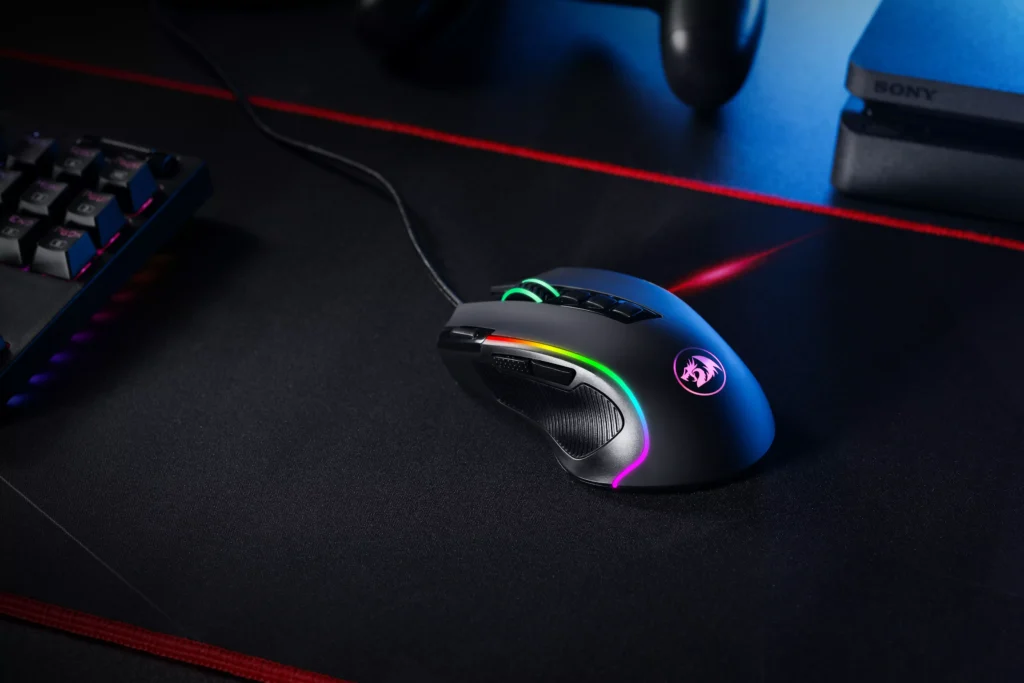It’s no secret that video games are becoming increasingly popular, with people of all ages spending hours in front of their screens playing their favourite titles. But what are the benefits of gaming, and why is it such a popular pastime?
In this article, we cover some of the benefits of gaming in all aspects of your life from physical aspects to mental and social aspects.
The positive effects of gaming
We often hear about the negative effects of gaming, but there are actually several positive effects of gaming as well. Gaming can improve mental and physical health, social skills, and even academic performance.
1. Gaming can improve mental health.
Studies have shown that gaming can improve mental health by reducing stress and anxiety. Gaming can also improve mood and focus, and help people cope with depression and loneliness.
2. Gaming can physical health.
Gaming can boost physical health by improving coordination, balance, and reflexes. Additionally, gaming can help reduce pain for people with chronic conditions like arthritis.
3. Gaming can improve social skills.
Gaming can be a great way to connect with others, especially for introverts or people who have a social anxiety disorder. Gaming can also help people develop teamwork skills and learn how to resolve conflict peacefully.
4. Gaming can improve academic performance.
Despite the common belief that gaming is a waste of time, studies have shown that gaming can actually improve academic performance.
Gaming can improve memory, concentration, problem-solving skills, and critical thinking skills.
Additionally, games that require strategic thinking can help students learn how to plan ahead and think abstractly.
The mental benefits of gaming
Games not only relieve stress and tension but also provide a sense of achievement, satisfaction and community.
In fact, gaming has been found to have numerous mental health benefits, including:
- Reduced stress and tension
- A sense of community
- Improved mood
- Increased self-esteem
- Improved cognitive skills such as problem-solving, strategic thinking and planning.
The physical benefits of gaming
You may not think of video gaming as a physical activity, but it can be! In fact, there are many benefits to be had from gaming, both physically and mentally.
Physical benefits:
- Improved hand-eye coordination
- Increased dexterity
- Increased reflexes
- Enhanced core strength
- Better posture
Mental benefits:
- Improved problem-solving skills
- Enhanced memory and recall
- Improved concentration and focus
- Enhanced creativity and imagination
The social benefits of gaming

Gaming can help you make new friends, learn important life skills, and even get a leg up in your career.
One of the best things about gaming is that it’s a great way to meet new people. If you’re shy or introverted, it can be tough to make friends in real life.
But when you’re playing games online, it’s easy to connect with other people who share your interests.
You can also bond with friends and family members over your favourite games.
In addition to meeting new people, gaming can also help you learn important life skills.
Teamwork, strategic thinking, and problem-solving are all important skills that can be developed through gaming.
These skills can come in handy in various real-life situations, from leading a project at work to dealing with a difficult personal issue.
Finally, gaming can also give you a leg up in your career. Many employers are now looking for candidates who have strong problem-solving and collaboration skills(skills that can be developed through gaming).
So if you’re looking for a way to stand out from the competition, consider adding some gaming experience to your resume.
The educational benefits of gaming

Many kids love to play video games. In fact, the gaming industry is now bigger than both the film and music industries combined.
While there are some who worry about the amount of time spent playing games, there is growing evidence that gaming can have some positive educational benefits.
One of the biggest advantages of gaming is that it can help children to develop problem-solving skills.
Games often present players with puzzles or challenges that need to be overcome, and this can encourage kids to think creatively in order to find a solution.
This type of thinking is essential for success in school and in the workplace.
In addition, gaming can also help children to develop strong hand-eye coordination and fine motor skills.
This is because many games require players to use a combination of physical and mental skills in order to succeed. For example, first-person shooter games like Call of Duty or Fortnite require players to have excellent hand-eye coordination in order to aim and shoot accurately.
Platform games like Mario or Sonic the Hedgehog often require split-second timing and precise movements in order to jump over obstacles or reach specific areas.
Finally, gaming can also help children to develop social skills and teamwork.
Many modern games now allow players to interact with one another online, and this can be a great way for kids to make friends and work together towards a common goal.
These social interactions are important for developing empathy and emotional intelligence, which are essential life skills.
The cognitive benefits of gaming

A growing body of research is beginning to reveal the cognitive benefits of gaming.
A recent study by the University of Rochester found that action-based video games, such as first-person shooters, can improve a player’s capacity for multitasking, attention span, and visual acuity.
Other research has shown that gaming can improve problem-solving skills and memory.
There are a number of factors that contribute to these cognitive benefits.
First, video games require players to make quick decisions in order to succeed. This helps to train the brain to become more adept at making split-second decisions.
Additionally, video games often involve complex rule sets, which help to engage the player’s working memory.
Working memory is responsible for temporarily storing and manipulating information, and it is known to be an important predictor of academic success.
It is important to note that not all video games are equally beneficial for the brain. The cognitive benefits of gaming are most pronounced in action-based games that require quick decision-making.
Games that are predominantly passive, such as puzzle games or narrative-driven games, are less likely to produce these cognitive benefits.
The emotional benefits of gaming

It’s no secret that games can make us feel good. They can be a great way to relieve stress, unwind after a long day, or simply cheer us up when we’re feeling down.
But did you know that gaming can also have some positive effects on our emotions?
Studies have shown that gaming can help improve our moods, increase our happiness levels, and even reduce feelings of anxiety and depression.
It’s not just anecdotal evidence – there is scientific proof to back up these claims.
One study, for example, found that participants who played games for just 20 minutes per day experienced a reduction in negative emotions such as fear, anger, and sadness.
Another study found that people who played “ Tetris” following a traumatic event were less likely to develop PTSD than those who did not play the game.
So next time you’re feeling down, pick up your controller and give gaming a try. You may be surprised at how much better you feel afterwards.
Conclusion
For years, gaming has been perceived as a complete waste of time by many and this can be attributed to people not knowing the true benefits of gaming. In this article, we covered some of the benefits of gaming. What other benefits of gaming do you know of? Thank you for reading.



